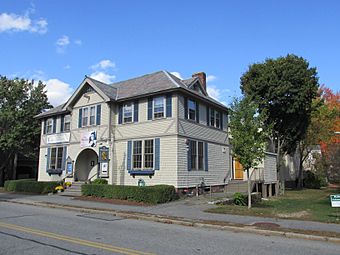Concord Armory facts for kids
Quick facts for kids |
|
|
Concord Armory
|
|

Historic Concord Armory,
now the Performing Arts Center at 51 Walden |
|
| Location | Concord, Massachusetts |
|---|---|
| Area | less than one acre |
| Built | 1887 |
| Architect | Chapman, John; Blackwell, Clarence; Little, Harry |
| Architectural style | Queen Anne |
| NRHP reference No. | 07000945 |
| Added to NRHP | September 12, 2007 |
The Concord Armory is an old building in Concord, Massachusetts. It used to be a place where soldiers kept weapons and trained. Today, it's known as the Performing Arts Center at 51 Walden. This center is a busy spot for local arts groups.
Groups like The Concord Players, The Concord Band, and The Concord Orchestra use this building. The armory was built in 1887. In 2007, it was added to the National Register of Historic Places. This means it's a special building that is important to history. It's rare to find an old wooden armory that is still in such good shape.
Contents
A Building with a Story
The Concord Armory has changed a lot over the years. It was built in different steps between 1887 and 1927. First, the front part, called the headhouse, was built in 1887. Then, a large drill shed was added in 1888. This shed was where soldiers practiced their drills.
From Military Training to Theater
In 1896, the drill shed was made even longer. Later, in the 1920s, the building got a big makeover. It was changed to be used by groups like the Concord Players. A stage area was added, designed by a famous theater architect named Clarence Blackall. In 1927, the stage area was made even bigger. This extra space was for storing scenery for plays.
In the 1970s, a group called the Friends of Performing Arts in Concord (FOPAC) took over the building. They changed the inside a lot to make it perfect for performances.
What's Inside Today?
Today, the lower part of the front section is a lobby. This is where people gather before shows. The upper part of the front section is now a dance studio. The big drill shed has become a theater auditorium. You can still see the original wooden beams on the ceiling. The walls have special materials to make the sound better for performances. The basement of the building is used for storage and dressing rooms for the performers.
A Community Hub
Throughout the 20th century, the armory was used for many things. In the 1920s, the American Red Cross showed films there. From 1933 to 1946, it was even used for the town's annual meetings. It also housed town offices and a youth center.
By the 1950s and 1960s, the building was getting old and worn out. Some people thought it should be torn down. But the community loved the building and spoke up to save it! Because of their efforts, the building was saved. In 1972, FOPAC was formed to turn it into the wonderful performing arts center it is today.



